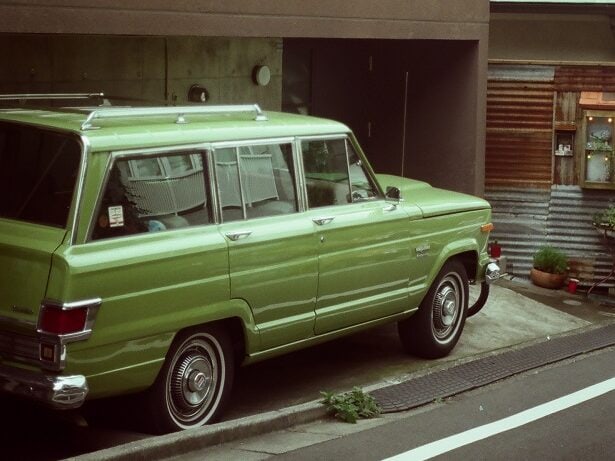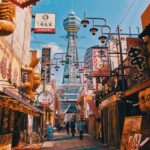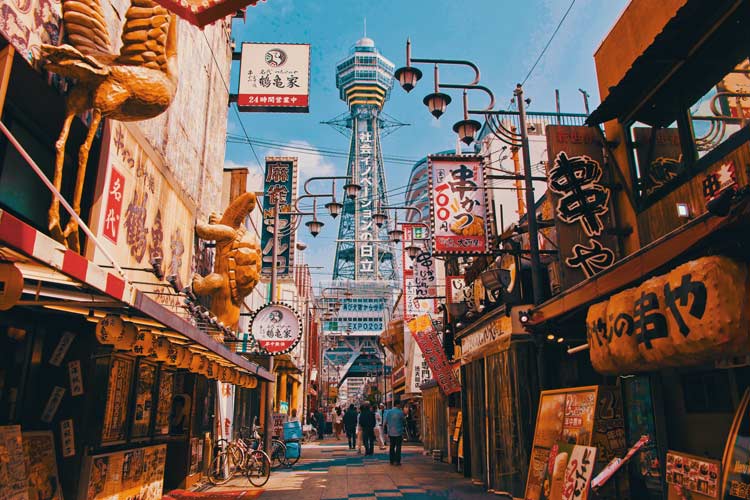I could feel it as if it had just happened. The hot sweat on my skin, the late summer mosquitoes buzzing around my head, and the looks of fast pity – a gaze that almost wasn’t – as I carried my luggage uphill towards the university, just arrived from the airport.
I was in Japan for a 6-month research stay at the University of Doshisha and my supervisor had wanted to meet me immediately, bags and all, as soon as I stepped on the prefecture.
I was now settled in a student dorm in a rural, sleepy area in the center of the triangle formed by Kyoto, Nara, and Osaka. My everyday view was a patch of dancing bamboo that provided some shade to the town cemetery, and a carpet of red, brown, and yellow leaves covering soft, waving hills, with a few specks of suburban family houses popping out of the scenery.

TRAVELING TO OSAKA WAS A DREAM
It had always been a dream of mine, living somewhere as removed as possible from my own culture. Japan seemed like the perfect pick. But why had I wanted to go to foreign places so eagerly, I wondered? Why the urge to travel?
The first reason, if I was honest, had to be food, but there was a second explanation to that desire, and that was to understand different ways of being on the planet, of interpreting what it is that we are; maybe soul, maybe recycled material from trees and rocks, maybe a piece of God, maybe nature, maybe nothing at all. That precise way of being that was Japan was still to me an ocean of unknowns.

I opened my convenience store oyakodon and put it in the microwave. It was Saturday, and Saturdays were always lazy. Everyday was lazy here. In a heavily overcrowded country, there was always a strange sense of personal space. One could even call it loneliness. I stared at the turning plate, sitting still on the floor like a wannabe, bored Buddhist monk.
I was making time before I left to Osaka for a concert by the American punk band Antemasque and the Mexican band Le Butcherettes, with nothing to do but look and wait. Beep. I took my food out, and the sweet smell of soy and mirin occupied the 4.5 tatamis – and their corresponding vertical airspace – that made up the room.
Ever since I found out about this dish, I had liked its name as much as its taste. Oyakodon. Oya (親), meaning parent, ko (子), child, and anything ending with don (丼), a bowl of rice with something over it.
OSAKA
Private Osaka Tour with a Local, Highlights & Hidden Gems 100% Personalised
The parent-child bowl was made of chicken and egg over rice. Was I approaching something uniquely Japanese here? A perverse sense of humor, maybe, hidden in everyday, dull life?
But, if I was honest, everything seemed, though hard to understand, uniquely Japanese on this island. Even riding a train was a cultural experience, a shock of sorts. Bodies facing the windows in an orderly fashion, green, organized countryside slipping by as if a gif repeating itself forever, comfortable chairs with heating where short-sleeved workers with white shirts could sit in during the winter, and a thousand ads of bright colors and overall differentness.
A moving train served as a good metaphor for the Japanese heart. Collective in its direction and effort yet individual, efficient, strong, resilient, polite, silent, punctual, beautiful, kind, and opaque, with its details hidden from sight. The more I learned, the more everything looked like a mystery.
MUSIC IS AN INTERNATIONAL LANGUAGE
After a couple of weeks of being in the country, and visiting Osaka, I had decided to join a music club where I could play the drums, something I used to do back home. Music is, after all, an international language, and making noise is always fun. Most music clubs seemed serious, committed to themselves in a very Japanese way.
After a careful, very short, consideration, I joined a music club of adorable weirdos with long hair, colorful shirts, and quirky smiles who, not speaking much English, loved to say “yeah, man” or “very cool” when not appropriate, played Super Smash Brothers and Final Fantasy VII like their lives depended on it, and dreamed of, at least once, being able to smoke pot.
Still, even in that space of transgression, tradition was respected. Shoes were taken off under every circumstance – I still remember the uncomfortable laughter when I first entered the club with my rainy day boots on -, and the best seats were reserved to the elders.
I had made one good friend in the club, Kouji. He was a guitar-playing, shy, tender man, who was studying a master’s in philosophy and could speak English decently. He imagined the West as some sort of 80’s American music video with lacquer and red cars and shoulder pads.
I had tried to convince him to come to the concert, but he just replied “Punk is OK, but not the best”, which meant he hated it. I had learned to understand a Japanese no, and this was as far as he was willing to go to express how keen he was on not going. Punk’s not for everyone, I guessed.
I left the house and walked to the train station. The streets were almost empty, unhurried with a distant sound of bells clinging in the wind. Perfectly cut trees, blue and red-tiled ceilings, wooden doors… Everything seemed easy, like it made sense naturally, even if it was a perfectly calculated effort. Every house fell perfectly into place with the rest. Even the occasional avant-garde building somehow clicked and felt becoming.
The train to Osaka – the fun, rowdy, almost un-Japan-like city – was filled with salaryman, elders, and school children. The first time I took it to Osaka, when the train braked, one of the suited men stepped on my foot unwillingly, yet violently, and continued staring into nothingness.
The first time this had happened, I was surprised, assuming this behavior to be out of Japanese etiquette. But there had been no apologies, not even a glance. “That was tatemae.” Kouji had explained a few days later over lunch with a giggle. “When dealing with someone outside of your inner circle, there is no need to show your true feelings, your honne, or even to apologize. He just wore the tatemae, the mask.”
MU (無) MEANS NEITHER YES NOR NO
He was being polite by not being polite. Leaving me out of the picture was more respectful than forcing me to interact out of my inner circle. Japanese people seemed to be able to conjure one thing and its contrary effortlessly. “I think this is hard to understand for westerners, sometimes.” Kouji went on.
“While you are dualists, we are monistic. You believe in absolutes, in opposites, such as good and bad, true and false, yes and no, etc. In here, we have mu (無), which means neither yes nor no. Or maybe both”, he said, while drawing the kanji on a napkin.
“Truth is something that is approached. It’s the same with everything else. One can be collective and individual at the same time. Laugh out of uncomfortability.” I sighed and moved my feet around in order to numb the pain. I felt like I was finally getting something. The art of both and neither.
I went inside the venue. The audience danced vigorously and made hand gestures and body swings in perfect sync. In between songs, silence. The audience listened to every word. How did this make musicians feel? Did they miss the cheering or were they happy to be truly listened to?
Once the concert was done, I joined Kouji and went out for a few drinks. People in Osaka are known, all across Japan, as the funniest, liveliest of the nation. Most comedians, as well as many musicians and actors, hail from this city. Kuidaore is one of its oldest, noblest traditions. Its meaning is “eat and drink until you drop”, and they live up to it.
This tradition is supposed to come from the times of the samurai, when the lower caste, the merchants, weren’t allowed to buy land, but, at the same time, were richer than samurais. They did what any good Osaka person would do, spend it all on drinks and food.
Coming out of enough drinking and eating to make the cast of Gaki no Tsukai proud, we saw a group of sumo wrestlers walk in front of us, strutting their impressive bodies like rockstars. Their hair was bundled in a bun, and their look was confident, their proud prance highlighted by the lights of Dotonbori, Osaka’s nocturnal district, dancing with the flow of the river.
We followed them from a distance. The ramen shops were open, steam and laughter popping out of them on full blast. We entered one next to the sumo wrestlers, ate expecting something to happen, and, when nothing but a very decent broth did, walked back to the train station to catch the first train home.
From the heated seat of the train, I saw the blurred fields, covered in darkness. I accepted the mystery. Maybe that was the reason to travel. Just not knowing. Seeing, not understanding, and moving on to something else.
That was the good part. Being relieved from that pressure, of knowing. I started to fall asleep, rocked by the slightly-lighted nothingness that carried me, and Kouji, and all of the unknown people home safely.
“By the way”, said Kouji suddenly, waking me up. “A cover band called Pex Sistols are playing tomorrow near here. Everyone is going. Let’s go.”
Didn’t he hate punk?
“Mu”, I thought of saying. “Yeah, man. Very cool”, I replied and went back to sleep.









